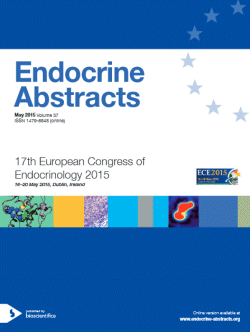Searchable abstracts of presentations at key conferences in endocrinology
Symposia
Non-classical causes of hypopituitarism (<emphasis role="italic">Endorsed by Endocrine Connections</emphasis>)
ea0037s3.1 | Non-classical causes of hypopituitarism (<emphasis role="italic">Endorsed by Endocrine Connections</emphasis>) | ECE2015
TBI: whom to screen for hypopituitarism
Traumatic Brain Injury (TBI) is a devastating neurological emergency, usually resulting in transient or permanent neurological dysfunction. It is the most common cause of death and disability in young adults in industrialised countries and is a major public health problem. Although anatomical pituitary damage following TBI was first recognised as long ago as 1918, evidence of hormonal dysfunction in both the acute and chronic phases following TBI had only been studied in detai...
ea0037s3.2 | Non-classical causes of hypopituitarism (<emphasis role="italic">Endorsed by Endocrine Connections</emphasis>) | ECE2015
Genetic causes of hypopituitarism
Genetic causes of anterior pituitary hormone deficiencies may result in combined or isolated pituitary hormone deficiencies. These disorders represent a heterogeneous group of rare diseases leading to defective function of specific pituitary cell types. Since the first description of POU1F1 human mutations, several other genetic defects of transcription factors have been reported with variable degrees of phenotype-genotype correlations. However to date, despite the identificat...
ea0037s3.3 | Non-classical causes of hypopituitarism (<emphasis role="italic">Endorsed by Endocrine Connections</emphasis>) | ECE2015
Drug induced hypopituitarism
Pituitary dysfunctions, reported as hypopituitarism or hypophysitis, are relatively common side-effects induced by monoclonal antibodies (mAbs) inhibiting specific immune checkpoints. In particular, hypophysitis represents a distinctive side effect of CTLA4-blocking antibodies and is a new form of autoimmune pituitary disease.In initial trials, the incidence of hypophysitis induced by anti-CTLA4-mAbs (ipilimumab and tremelimumab) ...




